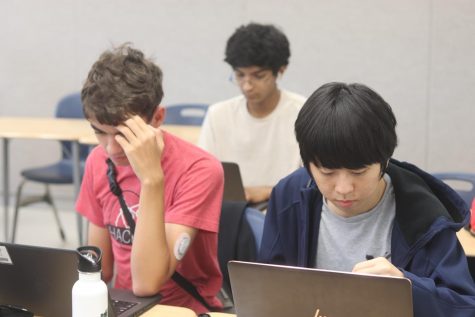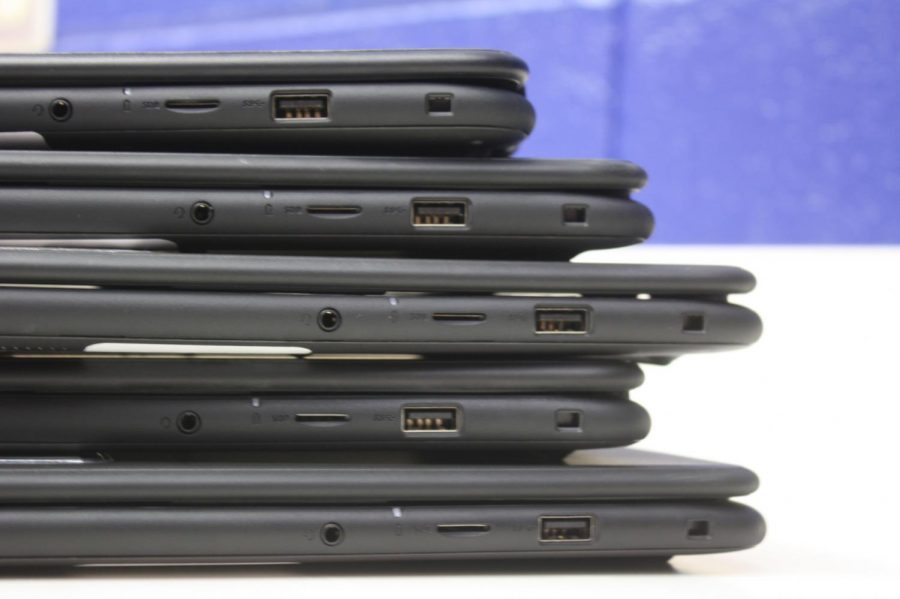Power up
Laptops guaranteed to every student. What began as a call for technological improvement has become a source of disagreement as some students worry over the choice of technology.
The Dell Latitude 3300 XCTO in the storage room.
September 18, 2019
Laptops guaranteed to every student. What began as a call for technological improvement has become a source of disagreement as some students worry over the choice of technology.
Overview
FCPSOn began as a pilot program in 2016 with the Chantilly Pyramid and eLearning Backpack organizations that expanded to include more FCPS schools each year. In the 2019-2020 school year, all high schools in FCPS implemented this program by giving each student a Dell Latitude 3300 XCTO. Students are charged a $50 technology fee, and old laptops are given to FCPS middle and elementary schools.
“This is a good thing,” principal Ann Bonitatibus said. “We want new devices in our school and we want other schools without rich resources like TJ to have enough devices for their students.”
The newly implemented policy also provides opportunities for students who did not previously own a personal device.
“I think it’s good for [FCPS] to give us a laptop because I have my own personal laptop, but a lot of people don’t,” sophomore Sruthi Sankararaman said.
While FCPSOn intends to put students on the same playing field, some students are concerned that the newly provided laptops will not be able to perform at the standard they expect of their personal devices. Students taking Japanese were able to download the necessary keyboard, but are only able to type English characters with their school-given laptops.
“[Japanese] is a language that does not have regular Latin characters,” junior Chabeli Yumang said. “This is problematic because I will have to take AP exams, and we will have to do writing practice.”
Some also worry that switching between school and personal laptops will be difficult.
“I know a lot of us have our prior work and we just have our way of doing things all figured out on our own laptops,” senior Tvisha Subhashish said. “Having to split work between two is definitely hard.”
Although an adjustment for some students, FCPS cites the division between school and personal laptops as a lesson they hope to teach through FCPSOn. Additionally, the FCPS-provided laptops have unique teaching software, allow students to print at school, and act as their testing device. Being able to access the school’s printing network is especially attractive to some students.
“This will actually probably be a really good advantage just because I wouldn’t have to rush to the library or a commons to print something,” senior Nitin Elavarasu said.
Impacts on the Classroom

Seniors Koushik Thiyagarajan and Jack Mallek work on the school-provided laptop while senior Daniel Kim works on his personal device.
Jefferson’s computer science program plans to test the new laptops in a few sections of their Foundations in Computer Science and AP Computer Science and Data Structures courses.
“Early tests last spring indicated that the new laptops will be sufficient at those levels, although using them at scale requires a sufficient maintenance system as well, which right now is the big unknown,” lab technology teacher Shane Torbert said.
Because the computer science department does not anticipate using the FCPSOn laptops for their post-AP computer science courses, Torbert, who primarily teaches post-AP courses, does not expect any changes in his classroom operations.
“Since about 2012, students have reliably used personal laptops, where possible, in my classes,” Torbert said. “I anticipate the new laptops will operate similarly.”
Furthermore, implementation of FCPSOn will not affect the use of essential CSL services unique to Jefferson. Issues with these online services, which are handled by Student Systems Administrators, are unrelated to issues with the FCPSOn devices, which are addressed by Jefferson’s Technology Team.
“FCPSOn has no impact on the quality or reliability nor change how students interact with CSL services such as Ion, Webmail, or Director,” Lead Student Systems Administrator Theo Ouzhinski said.
In some humanities classes, FCPSOn will lead to a greater presence of technology in the curriculum.
“FCPS has also obtained three online basal resources for instructional use in English classes: myPerspectives, an online textbook, NoRedInk, an online resource targeting grammar and writing instruction, and iLIT, a program to support students who need additional reading support,” English teacher and humanities division manager Suzette Henry said.
Opting-in vs. Opting-out
FCPS does offer students the chance to opt-out of the initiative. In order to do so, students must turn in a signed authorization form and schedule an appointment between their parents and the technology coordinator, Mr. Leo Resquin, to ensure that parents are fully aware of the benefits in using the school-issued laptops.
Though students across all grade levels expressed their frustration over the initiative, the administration, technology team and principal Dr. Ann Bonitatibus have urged students to test out the FCPSOn issued laptops before opting out of the program.
“We want all students to accept the devices at the beginning of the year. Try them for a few weeks before making a decision to opt-out,” Bonitatibus said. “Think of it as going to work and it’s the device your employer has for company business.”
Despite student skepticism, teachers and administrators are hopeful that the initiative will bring new teaching opportunities.
“There are some exciting opportunities on the horizon, to be sure,” Henry said. “But as with any new initiative, it is important to be nuanced in terms of approach and implementation. Balance will be key.”






